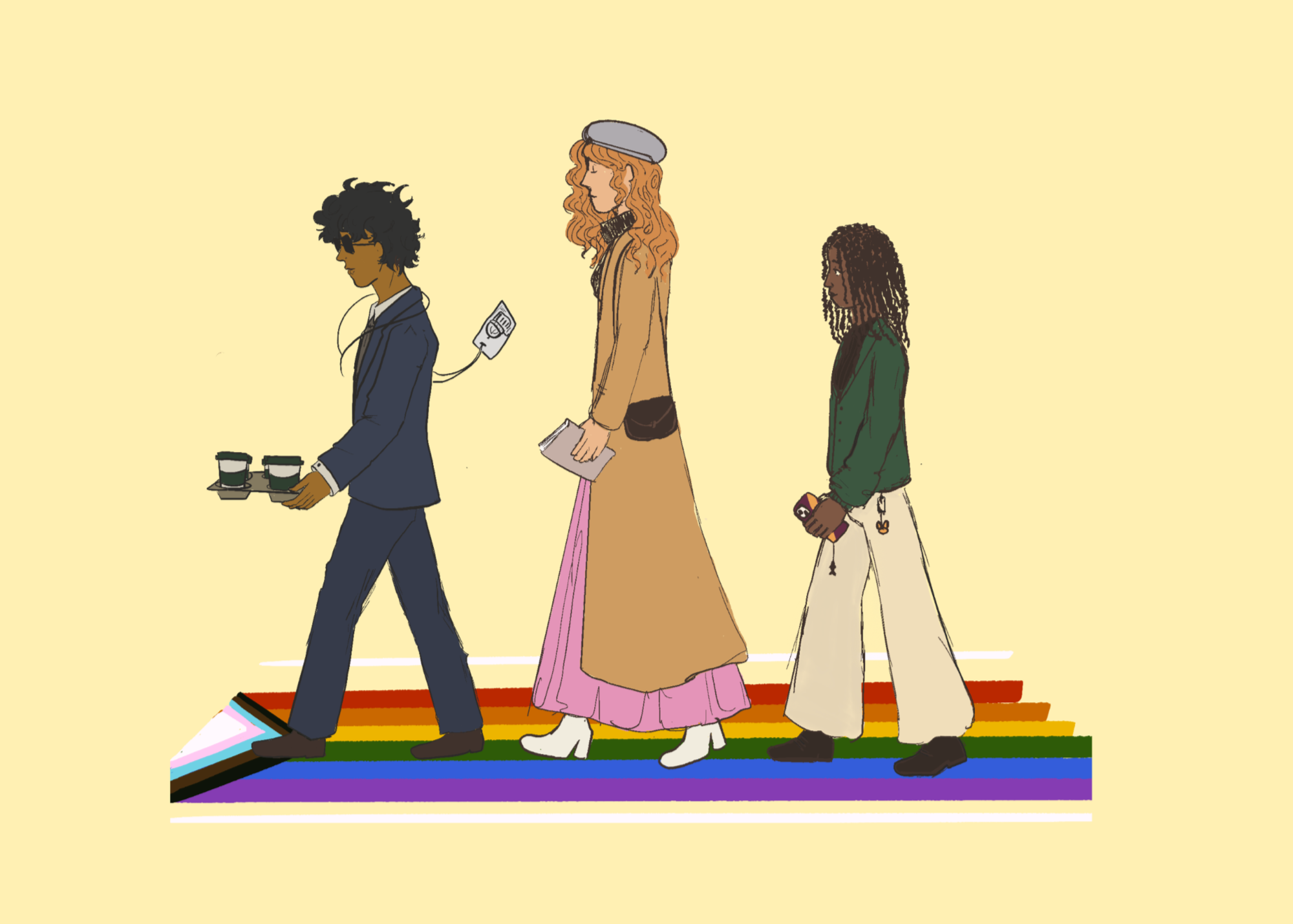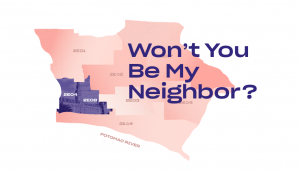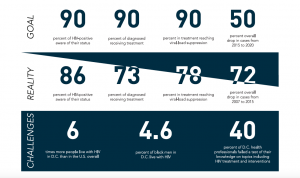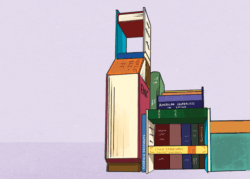Georgetown students go to school in the “gayest city in the country.”
With 14.5% of its population identifying as LGBTQ+, D.C. has a larger percentage than any of the 50 states. This percentage is nearly twice as high as in Oregon, the state with the next highest percentage of LGBTQ+ individuals.
Experts and historians have a range of theories, from its historic and current political activism to its robust social scene, on what makes D.C. such a stronghold for the LGBTQ+ community.
A change-making city
Above all, the most mentioned reason for D.C.’s extensive LGBTQ+ community is the District’s proximity to the center of change. Being miles away from the White House is not just a coincidence; it’s a choice that many LGBTQ+-identifying people make to be closer to political action, advocates told the Voice.
“Because of its centrality in national life, the city has also drawn women and men with political skills and interests and an ability to organize to resist being erased,” wrote Mark Meinke, founder of the Rainbow History Project, an organization that collects and promotes the history of LGBTQ+ life in D.C.
“The community’s political skills have meant that LGBTQ citizens are watchful and responsive to threats and other challenges,” Meinke continued.
Dave Perruzza, the owner and manager of gay bar Pitchers and lesbian bar A League of Her Own, agrees.
“Somebody told me once that D.C. is filled with ex-Yearbook Committee members, high school vice presidents, and high school presidents,” Perruzza said. “Everybody who wants to make change comes to D.C., and that’s a lot of queer people from smaller towns that don’t see themselves in their own cities.”
Historic activism
LGBTQ+ activism in D.C. has been flourishing since the early 1960s, Meinke told the Voice, when Frank Kameny and Jack Nichols established the Mattachine Society of Washington, a gay rights organization.
Kameny established the society after being fired from the U.S. Army Map Service for his sexuality and would later go on to become the first openly gay man to run for Congress. Nichols was a writer who worked on fostering relationships between the LGBTQ+ community and religious groups from various denominations. The Mattachine Society paved the way for public queer advocacy in D.C. by advising LGBTQ+ federal employees on their rights, organizing public demonstrations, and liaising with civil and religious groups, according to Meinke and other advocates.
“The original Mattachine invented the modern LGBTQ template for activism,” Charles Francis, the president of the new Mattachine Society, formed in 2011, wrote to the Voice.
The current society is dedicated to archiving LGBTQ+ history in D.C., similar to the Rainbow History Project. However, its predecessor took a more active role in calling attention to gay rights. The society provided support to gay people who had been arrested and fired, and it established further visibility for gay rights through protests and policy campaigns.
“The group carried out the first public protests by homosexuals, beginning in the spring of 1965 (in front of the White House),” Meinke wrote.
In part because of the work done by the Mattachine Society and similar organizations, a culture of acceptance was formed, encouraging people of all sexual and gender identities to live in D.C., advocates told the Voice. It also paved the way for the District’s LGBTQ+ community today.
Political awareness
D.C. is unique because its residents are both educated on the current political climate and have the proximity to work directly to change it, according to Brianna Battle, founder of QueerTalkDC. QueerTalkDC is a social media platform that highlights queer events in D.C. and a consulting company for creators seeking to reach the queer community.
She herself is no stranger to the political landscape, having worked in Congress as a staffer for almost 10 years.
Now, Battle is a full-time content creator, posting guides and events for queer people in the greater Washington region. She has dedicated her time to building community, including through coordinating large-scale queer events, such as markets and a camping retreat bringing together queer-identifying individuals.
“I want to let queer people know what’s happening every single week, even if it’s a lot of work,” Battle said.
Queer-friendly scene
LGBTQ+-friendly culture is only growing in D.C., and advocates like Battle said that this robust community is another reason why the District remains the “gayest city in the country.”
“D.C. is so unique, it’s very artsy,” Battle said. “We have a nice little edge to us.”
In her work building queer community, Battle said that she most enjoys getting to help queer people experience new things. She recalls being moved to tears as people came up to her at the camp, saying that they had gone camping for the first time because of the event.
“I want queers to take away the fact that they can and should do anything that heterosexual people do,” Battle said. “Anything you see can be transformed into a space for the queer community.”
Battle pointed to the area’s many LGBTQ+-friendly businesses as one important reason that the queer community thrives in the District.
“There’s something very pro-business, very pro-queer business here in Washington D.C.,” Battle said. “We like to support each other monetarily, which is dope. That’s why I feel like markets do very well, performances do very well, festivals do very well here because we have fun listening to music, having a libation, and supporting each other.”
Perruzza runs two of these businesses, which serve as safe spaces for LGBTQ+ people, he said.
“Sometimes I’ll just sit at the bar and look at all of these people having fun and feeling comfortable and knowing that they’re safe and knowing that I did that,” Perruzza told the Voice. “I’ve never met somebody who didn’t feel comfortable here.”
Allie Gaudion (CAS ’26), Advocacy Director for GUPride, said that these spaces have become a hallmark of Washingtonian culture for young people.
“I always hear people saying, ‘Oh, we’re going to go to Pitchers. Oh, we’re going to go to A League of Her Own,’” Gaudion said. “These queer bars being so central, I think, is so cool.”
Youth in the city
Gaudion said that this LGBTQ+ social scene thrives in D.C. in part because of the city’s youthfulness.
As of 2022, millennials made up 53% of D.C.’s population, making it one of the most popular cities for young single people to live in. The population is especially youthful when students from D.C.’s approximately a dozen colleges are in the city.
“People say it all the time, but the younger generations tend to identify more or be more publicly out as queer,” Gaudion said.
Research agrees. Studies from Gallup show that each younger generation is about twice as likely to be LGBTQ+ identifying as the previous one.
Some young people, including Georgetown students, said they find themselves drawn to D.C. because of its diversity.
For Mara Stephens (SFS ’27), a transfer student, D.C.’s LGBTQ+ community is more diverse than her hometown in Vermont.
“People in D.C. and on Georgetown’s campus are from all over the country,” Stephens said. “Back at home, there was an LGBT community, but it was very small, and it was all people who were local to the area.”
For Devin Weil (CAS ’28), a Georgetown student from southern Florida and a member of the LGBTQ+ community, the difference was even more pronounced.
“Obviously, it’s really difficult being an LGBTQ+ person in Florida, so being in D.C. is definitely much more accepting,” Weil said. “It’s almost like it is the norm here, which is kind of funny.”
LGBTQ+ community on campus
Gaudion, Stephens, and Weil have found LGBTQ+ community both on and off campus. However, while student advocates said they feel supported by these communities, some believe that the work at Georgetown is not done.
The LGBTQ Resource Center in the Office of Student Equity and Inclusion frequently aims to foster connection on the Hilltop through experiences such as “OUTober,” a celebration of LGBTQ+ History Month including various social events. Stephens has attended a few of them.
“They were great, they were really welcoming and friendly,” Stephens said. “I can’t say that I’ve had any negative interactions or any issues where there’s been a lack of resources that I needed.”
GUPride, the student-run organization that Gaudion works for, also focuses on this same goal of community building. Gaudion’s focus is on improving the quality of life for LGBTQ+ students on campus.
“I have a series of issue areas that I’m focused on,” Gaudion said. “Primarily, this semester has consisted of getting a Queer Living Learning Community up and running, as well as working on the issues that have been posed for transgender students within gender inclusive housing.”
Crossroads, the former Queer Living Learning Community (LLC) at Georgetown, was created in 2018 but was shut down during the pandemic. Even when pandemic restrictions were lifted, the LLC never returned. Now, students like Gaudion are fighting to bring this space back to campus.
Gaudion’s work is not only motivated by specific action items but a general goal of protection for queer students.
“I want every queer student on campus to feel comfortable and safe,” Gaudion said. “Whether that be in their housing, whether that be in class, whether that be in the community with other queer people. It’s really important to me that everyone feels like there’s a space for them.”
Weil also hopes that the university continues to work to ensure that students feel safe. He said that sometimes, it feels like the university’s Catholicism juxtaposes LGBTQ+ identities.
“Obviously, it’s a little bit difficult being at a Jesuit university. Some of the values do come into conflict with the LGBTQ community,” he said. “I think for the most part it’s very accepting, but I definitely think there’s still work that can be done in terms of creating a Queer LLC, making resources more accessible to queer students, and helping trans people and more vulnerable individuals in the community.”
Despite further work LGBTQ+ students want to see from the university, advocates said that being in a LGBTQ+-friendly city like D.C. provides a supportive backdrop for change.
“A lot of these queer institutions in D.C. have been here for so long,” Gaudion said. “I keep seeing this statistic about D.C. being the gayest city in the country, and I feel like, in my experience, that has always been the case.”






